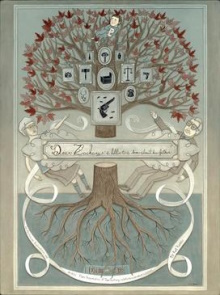I was aware of this documentary’s reputation as a real tearjerker but it still managed to leave me in shock. This is a very personal film made by a single person, Kurt Kuenne, in honor of his friend Andrew Bagby who had been murdered. The horror is that his murderer is his ex-girlfriend who was at the time pregnant with his son and the intent behind this film is to let the son Zachary know what kind of man his father was. The story develops into so much more than that as it touches the lives of so many people and resulted in the law being changed. I’m not sure that I’ve ever seen another documentary that is as charged with personal rage and frustration as this one as Kuenne really invests so much of himself into it.
Kuenne has always wanted to be a filmmaker and so growing up, his friend Andrew Bagby would often act in his amateur films. He decided to make this film after hearing of Bagby’s death at the hand of Shirley Turner, addressing it to his then unborn son. With the help of Andrew’s parents, his other relatives, his friends and his colleagues, Kuenne paints a picture of Andrew as a gregarious young man who was loved and remembered fondly by everyone. By contrast, they describe Shirley as being odd, being much older than him and already having three children with different fathers. The film shows how Andrew broke up with Shirley after completing his medical studies in Newfoundland and moving back to the US to work as a resident. Shirley then bought a gun, drove long distance to meet Andrew and shot him. Afterwards she returned to Canada before US authorities could arrest her. When Andrew’s parents discovered that Shirley was pregnant, they put aside their lives to move to Canada to fight for custody of their grandson. The extradition proceedings in Canada take so long that they are still ongoing by the time that the child, Zachary, is born. The Bagbys continue to fight Shirley for custody and to get time with Zachary, yet this is still far from the end of the story.
Early on, I was apprehensive about this being a hagiography of Andrew and skeptical about all of his friends badmouthing Shirley. After all, we never hear from anyone from her side of events so this could be a biased account. Subsequent events however prove that she really was a crazy bitch after all with no room for doubt and that the concerns and warnings of Andrew’s friends were justified. A key part of this documentary’s message is the failure of the justice system. The US failed to prevent her from returning home to Canada despite being a key murder suspect and the Canadian system not only let her repeatedly delay her extradition but let her out on bail and keep custody of Zachary. While there really are some egregious failures, Judge Gale Welsh’s decision for example to advise her on how to argue her own case or the fact that the psychiatrist who helped her and testified on her behalf John Doucet was one of her former co-workers, it’s also understandable why the system worked as it did. For good historically established reasons, most governments are now extremely reluctant to part children from their birth parents. The fact that Shirley was herself also a medical doctor must have helped persuade the judge. The Bagby grandparents’ activism eventually led to a new law to make it for difficult for accused murderers to get bail and that is a good step. But I still find it difficult to blame the overall system for this tragic case.
What stands out for me in this story is the incredible heroism and sacrifice of the Bagby grandparents David and Kathleen. To be forced to treat cordially with Shirley, knowing that she is the one who killed their son, in order to retain access to Zachary is unimaginably horrific. Hearing David talk frankly about his plans in detail to kill Shirley and accept the consequences is one of the darkest moments I’ve ever seen in a documentary. When one interviewee states that these events shook her faith in God, you really believe her. Using simple editing techniques, like repeating certain spoken lines over and over again, letting the images shake and become tinged with red, Kuenne unleashes his unrestrained rage, disbelief and frustration for the world to see. If you ever need another reminder that documentaries can’t and shouldn’t ever be neutral and objective, this serves as an unparalleled demonstration.
No words can really describe the immensity of this tragedy and the critics are right in that this is a story that will stay in your mind long after you’ve finished watching this film. The only consolation is to hope that this is a one-off event, a horrific crime perpetrated by a single uniquely crazy woman who was both psychotic enough to do something like this yet sane enough to convince judges and childcare workers that she is a competent mother.
